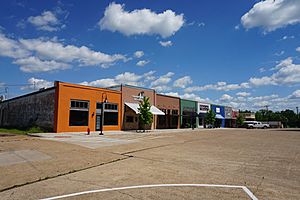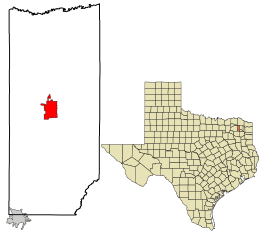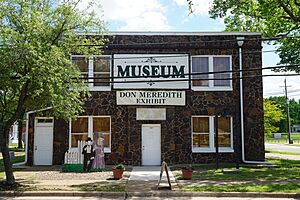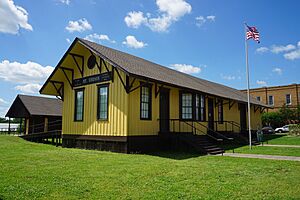Mount Vernon, Texas facts for kids
Quick facts for kids
Mount Vernon, Texas
|
|
|---|---|

Houston Street in downtown Mount Vernon
|
|
| Motto(s):
"A Texas Treasure"
|
|

Location in Franklin County and the state of Texas.
|
|
| Country | United States |
| State | Texas |
| County | Franklin |
| Area | |
| • Total | 4.40 sq mi (11.40 km2) |
| • Land | 4.31 sq mi (11.17 km2) |
| • Water | 0.09 sq mi (0.24 km2) |
| Elevation | 509 ft (155 m) |
| Population
(2020)
|
|
| • Total | 2,491 |
| • Density | 635.12/sq mi (245.21/km2) |
| Time zone | UTC-6 (Central (CST)) |
| • Summer (DST) | UTC-5 (CDT) |
| ZIP code |
75457
|
| Area code(s) | 903, 430 |
| FIPS code | 48-49860 |
| GNIS feature ID | 2413019 |
Mount Vernon is a small town in Texas, United States. It is the main town and center of Franklin County. In 2020, about 2,491 people lived there.
Contents
History of Mount Vernon
Mount Vernon began as a small settlement. It was located near Fanning Springs. People started living there as early as 1818.
In 1848, the United States government opened a post office. A year later, in 1849, the town was officially planned. Stephen and Rebecca Keith gave the land for the town. At first, the post office had different names like "Keith" and "Lone Star." This was because there were two other towns named Mount Vernon in Texas. In 1875, the name "Mount Vernon" became available.
Franklin County was created from Titus County in 1875. Mount Vernon was chosen as the county seat over other communities. This meant it became the main town for the county's government and business.
How Mount Vernon Grew
The town's economy first relied on farming. Farmers grew corn and cotton. In the 1920s, they grew over 500,000 peach trees. Watermelons were popular in the 1930s. In the 1940s, the county made a lot of cane syrup.
In 1936, oil was found in the northern part of the county. This helped the economy grow beyond just farming. Today, oil production continues. There are also light industries and factories. Mount Vernon stayed important as the county's economic center.
The town had churches, doctors, lawyers, and many shops. This was important before people could travel far easily. In 1910, the town officially became a city. They voted to have a mayor and a council. In 1911, they built a public water system. Later, electricity and gas services were added.
Downtown Area and Historic Sites
The downtown area of Mount Vernon feels like a small town. There is a central park with a pretty gazebo and benches. On the north side of the square is a beautiful courthouse. It was built in 1912 from white limestone. It has a clock tower that chimes. The courthouse was recently restored to look like it did in 1912.
Mount Vernon has a lot of history. More than 50 homes built before World War I are still standing. These homes have signs showing who first owned them and when they were built. You can get maps to tour these historic homes. There are also over 20 official historical markers in Franklin County.
Old trails run through the area. The Cherokee Trace is on the eastern side of the county. The Choctaw Trail goes through the county towards Dallas. Mount Vernon's Main Street is part of the old Bankhead Highway.
Geography and Climate
Mount Vernon is located in the middle of Franklin County. U.S. Route 67 goes through the northern part of town. It leads east to Mount Pleasant and west to Sulphur Springs. Texas State Highway 37 goes through the western side of town. It leads north to Bogata and south to Winnsboro.
Interstate 30 is on the southern edge of town. You can get on it from Exit 146 or Exit 147. I-30 goes east to Texarkana and west to Dallas.
The town covers about 4.4 square miles (11.4 square kilometers). Most of this area is land. A very small part is water.
Weather in Mount Vernon
Mount Vernon has a climate with warm summers and mild winters. The hottest month is usually August. The coldest month is January. The area gets a good amount of rain throughout the year. Snowfall is very rare.
Population and People
| Historical population | |||
|---|---|---|---|
| Census | Pop. | %± | |
| 1870 | 223 | — | |
| 1880 | 311 | 39.5% | |
| 1890 | 589 | 89.4% | |
| 1920 | 1,212 | — | |
| 1930 | 1,222 | 0.8% | |
| 1940 | 1,443 | 18.1% | |
| 1950 | 1,433 | −0.7% | |
| 1960 | 1,338 | −6.6% | |
| 1970 | 1,806 | 35.0% | |
| 1980 | 2,025 | 12.1% | |
| 1990 | 2,219 | 9.6% | |
| 2000 | 2,286 | 3.0% | |
| 2010 | 2,662 | 16.4% | |
| 2020 | 2,491 | −6.4% | |
| U.S. Decennial Census | |||
| Race | Number | Percentage |
|---|---|---|
| White (NH) | 1,590 | 63.83% |
| Black or African American (NH) | 305 | 12.24% |
| Native American or Alaska Native (NH) | 11 | 0.44% |
| Asian (NH) | 15 | 0.6% |
| Some Other Race (NH) | 23 | 0.92% |
| Mixed/Multi-Racial (NH) | 103 | 4.13% |
| Hispanic or Latino | 444 | 17.82% |
| Total | 2,491 |
In 2000, there were 2,286 people living in Mount Vernon. Most people were White, followed by African American and Hispanic or Latino residents. By 2020, the population grew to 2,491 people. The town's population is still mostly non-Hispanic white.
In 2000, the average income for a family was about $36,150. Some families and people lived below the poverty line. By 2020, the average household income had increased to about $56,016.
Museums and Attractions
Mount Vernon has several interesting museums and places to visit.
Fire Station Museum
This museum is in an old fire station built in the 1940s. It has many different exhibits. You can see displays of butterflies, bird eggs, and old tools. There are also wood carvings and Native American items.
One special exhibit shows the dental chair and tools used by a local dentist, Dr. Con Smith. Upstairs, you can find collections of bird eggs and butterflies. This museum is one of only a few that have eggs from birds that are now extinct. These include the Carolina parakeet, heath hen, and passenger pigeon.
The museum also has sports items from Don Meredith. He was a famous football player from Mount Vernon.
1894 Railroad Depot
The old Mount Vernon 1894 Cotton Belt Railroad Depot has been restored. It looks just like it did when it was first built. It has separate waiting rooms that were used during a time when people were separated by race. Today, these rooms hold exhibits.
The main office has old furniture and working telegraph equipment. One waiting room has a model train exhibit. The large freight room has an old 1899 Studebaker covered wagon. This wagon helps visitors see how transportation changed over time. There is also a small log cabin from the 1880s. You can also see old farm tools and a blacksmith shop.
Bankhead Highway Visitor Center
The Bankhead Highway was the first all-weather road across the country. It opened in 1919 and went from Washington D.C. to San Diego. This highway goes through Franklin County and is Mount Vernon's Main Street. It follows an old Native American trading route.
The Visitor Center has the Lowry Pavilion, which can be rented for outdoor events. It also has the Dupree Park Nature Preserve and Nature Trail. This trail is about a mile and a half long. It has special spots for bird watching. You can get a trail guide at the Visitor Center.
Alamo Mission Museum
This museum uses a copy of the Alamo Mission as its setting. It teaches about Texas history in a fun way. They host family events like a Chili Cook-off and a Bluegrass Festival. Other events include a Turtle Derby and Halloween Hayrides.
Old Mount Vernon Waterworks Plant
This plant is located on Holbrook Street. The first building was constructed in 1911. It was important for providing water to the town.
Recreation
Mount Vernon offers several places for fun and outdoor activities.
Little Creek Park
Mr. and Mrs. N. E. Dupree gave land to the city in 1958. They wanted to create a park for young people. The park has tennis courts and basketball courts. There are two playground areas and a baseball field. It also has a covered area for family gatherings and a walking trail. The park is located on Kaufman Street, just south of the town square.
Lake Cypress Springs
Lake Cypress Springs is in Franklin County. It is a great place for fishing, especially for bass. The lake is surrounded by 869 acres of public parks. These parks are managed by the Franklin County Water District.
You can find camper sites, shelters, and meeting areas at the lake's parks. There is also a marina with water playground equipment. Lake Cypress Springs was created in 1970. It has 3,400 acres of excellent fishing waters. Today, people mostly fish for Black Bass and catfish.
Education
The town is served by the Mount Vernon Independent School District. Students attend Mount Vernon High School. Their sports teams are called the Tigers.
Notable People
- Bobby Maples — a football player who played for the Houston Oilers, Pittsburgh Steelers, and Denver Broncos.
- Don Meredith — a former quarterback for the Dallas Cowboys and a famous TV sports announcer.
- Greg Ostertag — a retired NBA basketball player.
See also
 In Spanish: Mount Vernon (Texas) para niños
In Spanish: Mount Vernon (Texas) para niños



